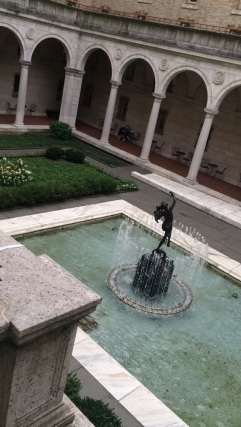
On Wednesday, February 3rd, I had the opportunity to listen to and meet an incredible individual – Nick Flynn. Nick is a memoirist and poet of the highly popular and award winning memoirs Another Bullshit Night In Suck City (2004), Being Flynn (2005), The Ticking is the Bomb (2010), and The Reenactments (2013), alongside books such as Some Ether (2000), My Feelings (2015) and more.
Nick was raised in the nearby town of Scituate, Massachusetts. He did his undergraduate work at the University of Massachusetts Amherst, followed by a fellowship at the Fine Arts Work Center in Provincetown, Massachusetts. After this, Nick pursued his masters degree in Fine Arts from New York University. Apart from Nick’s impressive educational background, he is also the winner of multiple awards and fellowships including the The Guggenheim Foundation, PEN, Columbia University’s Writing Project, and The Library of Congress.
I will be the first to admit that I have not yet read a single one of Nick’s memoirs or books in full, nor did I know who he was before learning of him in Literary Citizenship from our guest speaker, Fred Marchant. However, through Fred Marchant’s words describing Nick as a person, and his story, I was intrigued beyond measures in learning more about Nick and his experiences.
From my research, I gathered that he is not only a successful memoirist and poet from Massachusetts’ South Shore, but he is an outstanding and inspiring individual who has overcome an immense amount of hardship in his lifetime. In short, Nick’s father was mostly absent from his life. In his early twenties, while working in a homeless shelter in Boston, he encountered his father for the first time in over a decade, when his father came in for a bed – homeless. His mother, who raised Nick, committed suicide shortly after finding and reading what was an unfinished piece of Nick’s writing. Nick has overcome adversities associated with alcoholism, addiction, depression and more. But yet, he still manages to create beautiful and captivating pieces of writing – and he still manages to be an incredibly humble and down to earth individual. I know this because I met Nick, and I had a short but powerful conversation that led him to ask me to email him, and I’m waiting for my reply.

[Another Bullshit Night In Suck City – signed, “-Jennifer- (Guaranteed) Nick Flynn 2016. Feb. Boston!”]
Nick Flynn Visits Suffolk:
At 3pm on Wednesday the 3rd, I walked into an empty room in the Sawyer library of Suffolk University that I had never been in. It was a lovely little room; chairs aligned, beautifully carpeted floors, wooden doors, and colorful books straightened along a series of bookshelves in the back.
Familiar face, Fred Marchant took to the front of the room, his Poetry Center, to introduce Nick Flynn to the eager and diverse audience present. He introduced Nick as an old friend – a humorous, and talented individual who he had the pleasure of knowing for many years. After a few jokes and laughs, Marchant delved deeper into his introduction when he expressed that Nick has endured, in Marchant’s own words, “Unequivocal human catastrophes; alcoholism, addiction, homelessness, his mother’s suicide.” while going on to quote the great Roman aphorism and relating it back to Nick’s experiences, “Nothing human is alien to me,” This phrase now echoes in the back of my mind, as I’m sure it does for others present as well. He concluded his introduction of Nick with, “But Nick is not alone, we’re with him, he’s with us … So, welcome Nick.”
Nick brought with him a presence that was nothing short of casual, but captivating. I’m not sure what I was expecting, but what I received was different than I had imagined. He was a tall caucasian man, with five o’clock shadow (or three o’clock, rather), wearing a dark grey t-shirt and jeans. His hair was not well-kept but lose and natural. What I remember the most vividly about Nick’s appearance however, was his eyes. He had glossy blue eyes that seemed to reflect his experiences with nothing more than the way he looked at you, if that makes any sense. It’s as if, you were communicating emotion with nothing more than that eye contact, in that moment, when Nick was through reading a piece of his work. When individuals across the room would ask questions of Nick after he was through reading a piece, he seemed to have two responses – both of which filled with dry humor, I must add. If the question was on the simpler side, he would not break eye contact until the individual concluded their question, only to briefly look up, as if calculating his response, and then look back to that individual to answer. If the question, however, was deeper and required (in my own opinion), a more elaborate answer – I found that he would not look away for the entire interaction, almost as if he was responding not only through language, but with his whole self.
“Hello… I lived here a long time, until I escaped…haha.” Being immediately confronted with Nick’s sense of humor, I found similarities between my own personality and his.
As the reading unfolded, one piece uttered by Nick froze my fingers on my keyboard as I was taking notes. It left me with the following broken dialogue;
“It’s called Lava. A friend tells this perhaps apocryphal story …. while living in Hawaii a volcano erupted… it erupted so slowly that you could walk up to the wall of it, put your hand out and feel its warmth… the town my friend was staying in was spared the initial blast, but the lava kept coming… which house would be first to be swallowed up by the slow motion wave… some argued it was better than a flood or fire… lava gives you time to move out… you hoped it would slow down, hoped it would run out of juice, hope it would simply stop …. ”
I’m going to assume that it left listeners with the same chill as it did for me.
Then casually, without hesitation Nick went on. I emphasis his ability to be casual when discussing and reading his materials, because I think it adds a strong dynamic to Nick’s presence. His ability to use compartmentalization as a psychological tool when writing about his life (a question I asked him in which he humorously responded, he was working on with his therapist), helps to craft the carefully calculated and beautiful selections he shared with us – and all of his writings in general.
Now, keep in mind, I still have not read his books. I am basing my opinion of Nick solely off of my interactions with him on the third of February. But even so, Nick had a presence that was especially influential to me. That’s the magic of Nick Flynn – he influences people without explicitly wanting to, he does not view himself as special or unique – he is humble and full of humor, he is real. Nick is not at all self-absorbed or looking for acceptance – but rather, using writing as a tool to meditate and reflect on his own life.
I purchased Nick’s memoir, Another Bullshit Night In Suck City (2004), at the end of his afternoon reading. I made sure to stand at the back of the line, so I would be the last to introduce myself. Nick signed my book and we had our conversation. I expressed to Nick that I would not be able to attend his poetry reading later that night in Walsh Theatre because I had work, and we concluded our short interaction with a handshake and a smile.
When I got to work that night, I excitedly showed my signed book to my shift manager and explained to her my day. It was much to my surprise when she expressed her love for Nick’s work – and then told me to leave because I was doing a disservice to myself in not going to his Poetry reading in order to pour coffee at Starbucks for four hours.
At the poetry reading, I again asked the final question of the night – and Nick addressed me as Jennifer in front of the entire audience… To tell you the truth I don’t even remember my question. I just remember the way I felt while listening to his words throughout the day. His general audience is often left begging for understanding – and for those who do understand, he leaves us delving into our own minds for a deeper understanding of ourselves.
I’ll leave you with this,
“I didn’t choose this, I didn’t want to choose this … My story is not significant, I think it’s actually very common.” – Nick Flynn, February 3, 2016.
Jennifer Morasca

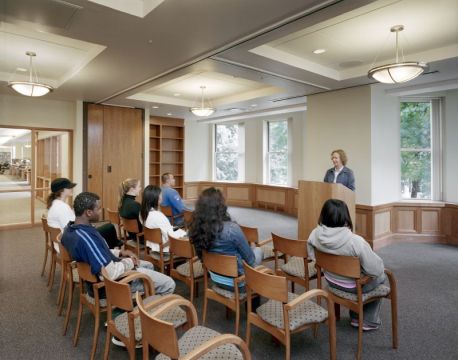
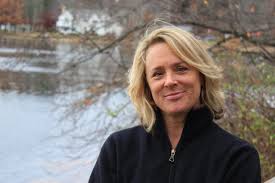
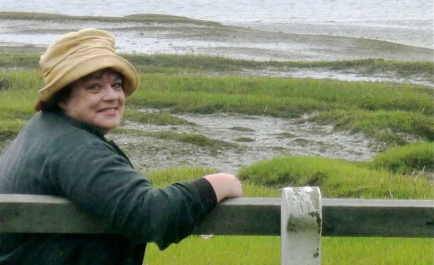
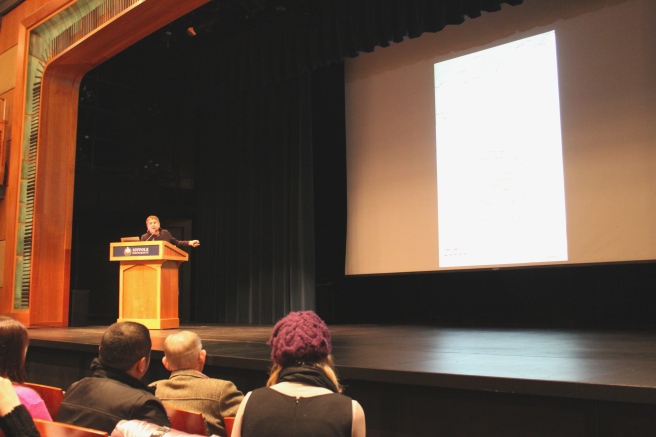
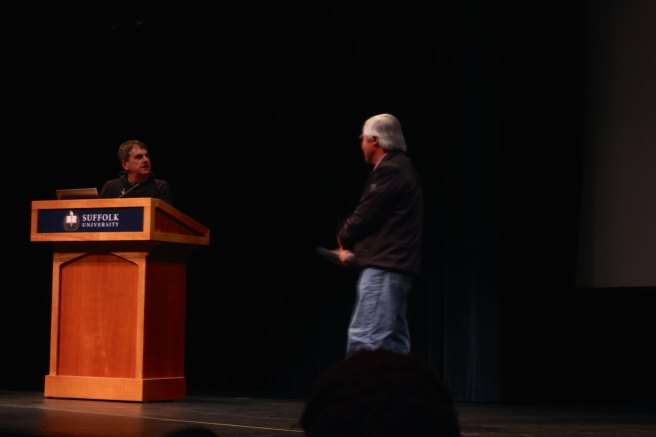
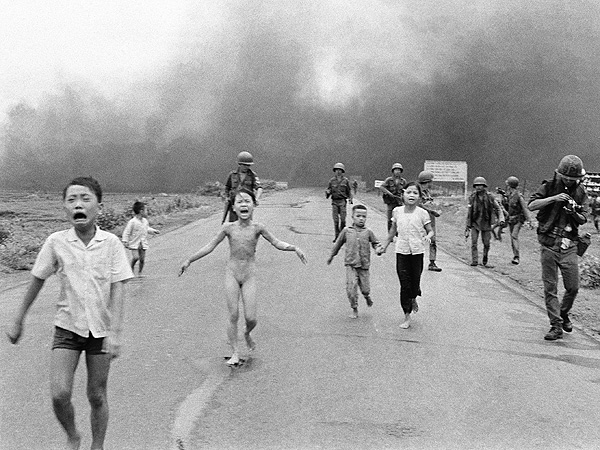
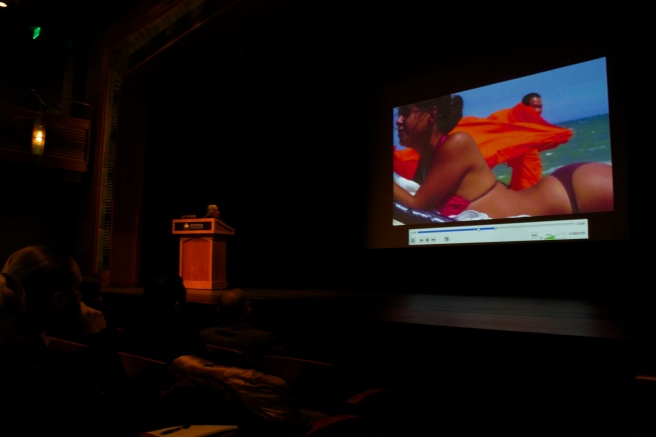
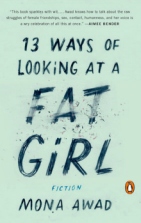
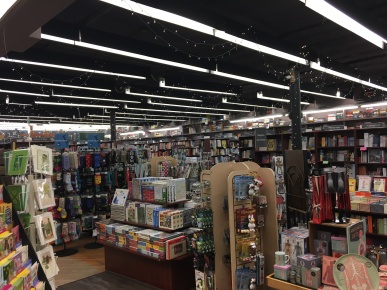
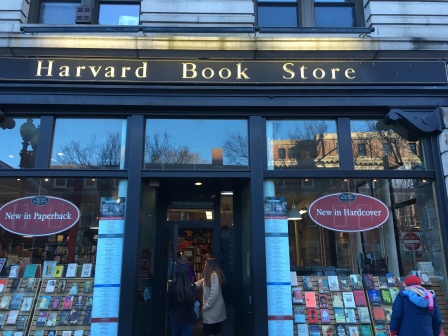
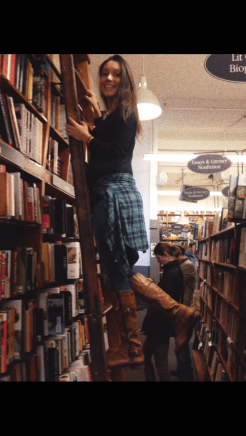


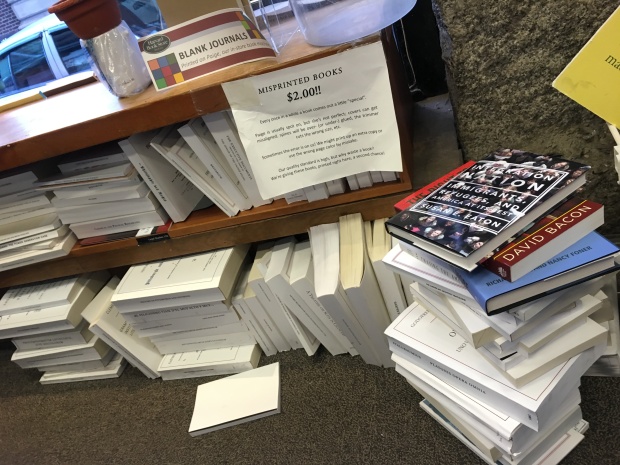


 audience ranges from children to the elderly. Readings are held at 7pm every third Friday of the month at Brookline Booksmith.
audience ranges from children to the elderly. Readings are held at 7pm every third Friday of the month at Brookline Booksmith.

